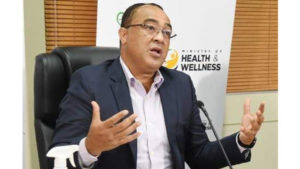 Health and Wellness Minister Dr Christopher Tufton yesterday reiterated that the Government’s position is that parental approval must be given in relation to COVID-19 vaccines being administered to children.
Health and Wellness Minister Dr Christopher Tufton yesterday reiterated that the Government’s position is that parental approval must be given in relation to COVID-19 vaccines being administered to children.
“We are deliberating and ensuring that is the case, but no decision has been taken around whether we will go ahead without that kind of consent,” he told journalists at Mandeville Regional Hospital.
Tufton was responding to yesterday’s Jamaica Observer front-page story which reported that some parents and their children are at odds over COVID-19 vaccines being given to minors.
Belair High School Principal Lawrence Rowe had told the Observer during a vaccination blitz at Bishop Gibson High School for Girls that parents were preventing their children from taking the vaccine, even in cases where the children expressed a desire to take the jab.
“You have the unique situation of students wanting to become vaccinated but their parents are hesitant to give the permission, so that’s a challenge that we face at Belair,” Rowe said.
“I have had my students reach out to me seeking assistance to become vaccinated but their parents are not giving the permission and, based on the law, they have to give permission for those students below the age of 18,” Rowe added.
Yesterday, Dr Tufton spoke to that legal requirement.
“There are some legal issues that are necessary to be confronted and the responsibilities that go with even the limited risks that may exist around anything happening to the child if they were being vaccinated with what kind of parental guidance,” he said.
“One cannot just make a decision like that; it would involve a lot more analysis and perhaps even some policy and legislative changes. That is something that we would have to deliberate on until a collective decision [is made],” he added.
The Government has been offering the Pfizer brand of COVID-19 vaccines to youngsters 12 to 18 years, and had initially prioritised it for the estimated 214,000 children in secondary schools. However, the take-up has not been as heavy as anticipated.
The Ministry of Health and Wellness, in a release yesterday, said that up to 5:00 pm on Wednesday, November 24, a total of 1,087,313 doses of COVID-19 vaccines have been administered. Of that total, 588,371 were first doses, 433,174 were second doses and 65,768 were single doses.
Tufton encouraged parents to recognise the benefits of having their children take the vaccine and said not doing so jeopardises the greatly anticipated return of face-to-face classes.
“… To the extent that parents restrict their children is unfortunate from our perspective, because I think it further denies the possibility of that face-to-face interaction without putting the child at risk. And any risk that they perceive from the vaccine is far less than any risk that they face, either from being out of school or being in school in a virus-infested environment,” he reasoned.
“The fact is those are two much greater risks, so it is unfortunate,” he added.
He said it is the objective of the Government to get children back into the physical classroom as soon as possible.
“… It is one of the burdens that I bear as a member of the Cabinet but also as the person responsible for health — just to work with the system in trying to get Jamaicans to come to terms,” he said.
“The Government is really committed to doing that and the first line of defence is for the vaccines to be taken by that age cohort,” he added.
He said the move by parents to restrict their children was expected due to vaccine hesitancy among the adults themselves.
“The lower-than-expected levels in the age cohort of children is a reflection of the low levels of vaccination in the wider society. We expected that if your parents are not taking it, quite a number of that group would restrict their children from taking it because it is the same belief and value systems that apply to the guidance that they provide to their children,” Tufton said.
The Government, he added, will have to work on the wider society, and not just parents restricting their children from taking the vaccine.
“Perhaps the first barrier is us to convince them to take the vaccines themselves, and that is an ongoing process. Right now, over the last number of weeks we have been doing about 35,000 vaccines per week. We would love to be doubling that or even greater,” he said.
